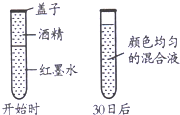问题
填空题
小明学习了分子的性质后做了如下实验:先在一支试管中装一半红墨水,再在液面上注满酒精(缓缓注入),加盖密封后静置,30日后再观察,现象如图所示.小明做的实验说明______和______.混合均匀后,分子______(选填“继续”或“停止”)运动.

答案
据图可以看出,30日后,红墨水和酒精的混合物体积减小了,这是因为酒精分子和水分子之间有一定的间隔,酒精分子和水分子不断运动到彼此的分子间隔间;混合均匀后,分子仍然继续运动,故填:分子是不断运动的;分子间有间隔;继续.
